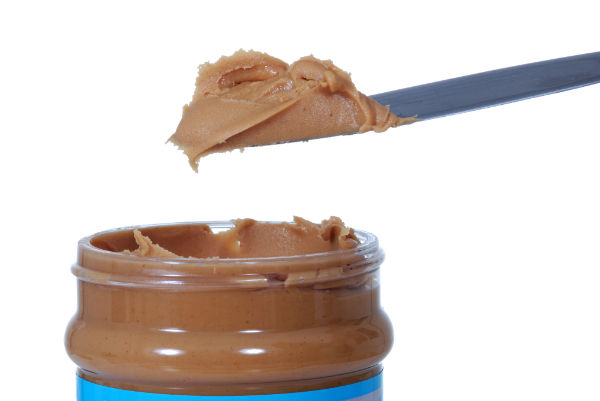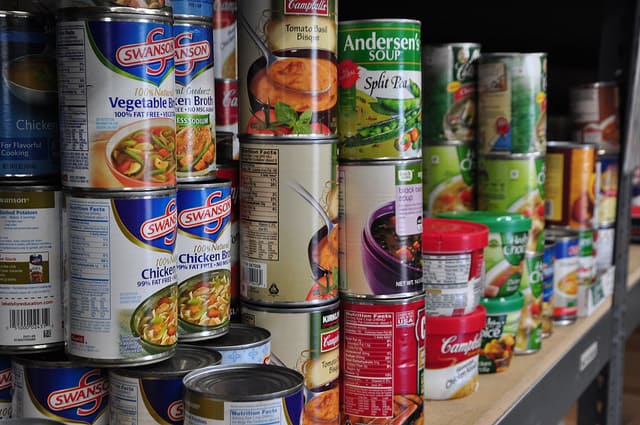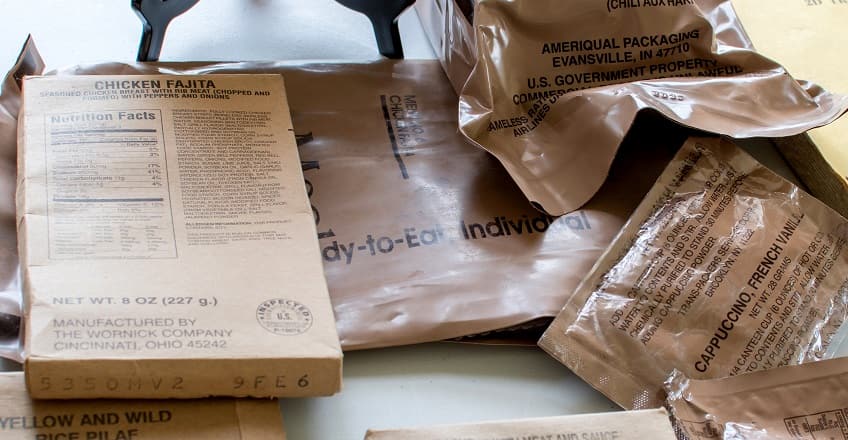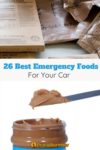Do you want to keep some emergency food in your car in case of breakdowns, getting stranded, or needing to bug out?
Most food – even “emergency food” – will quickly go bad in your car. But there are still lots of options.
Here’s what you need to know about car emergency food, including the best foods, which foods to avoid, and some planning tips. You might also want to read: Winter Vehicle Emergency Kit Checklist
Requirements for Car Emergency Food
Choosing the right emergency food for your car is tricky because it needs to be calorie-dense and survive extreme temperatures.
Heat is a huge problem because your car’s temperature can quickly reach over 120°F. If the outside air temperature is 95°F, your vehicle can get to 140°F!
Freezing temperatures aren’t as big of a problem with many foods. However, temperature fluctuations are problematic. When foods repeatedly freeze and thaw, moisture pockets can form. Mold and bacteria then thrive in these wet spots. This happens even with low-moisture foods like dehydrated fruits.
Foods You Shouldn’t Keep In Your Car
Surprisingly, many foods recommended for emergency preparedness are terrible for your car kit. I’ll go over a few of them here.
High-Fat Foods

High-fat foods like peanut butter, nuts, granola, and some packaged meals are susceptible to heat.
Even if you store the food in an oxygen-free environment (such as in mylar bags with oxygen absorbers), heat will still cause the fats to go rancid.
For example, one study found that it only took 8-12 weeks for peanut butter to go rancid when stored at 104°F. Eating rancid food won’t make you sick, so it is technically safe to eat. However, it tastes gross and might cause digestion issues. (2)
Animal Products
Many people recommend keeping animal foods like tuna pouches, beef jerky, and milk powder in the car for emergencies.
These foods are okay in cooler temperatures.
However, you don’t want these in your car in the summer heat. The high fat content means they will go rancid very quickly. On top of the rancidity issue, animal products are more likely to contain dangerous bacteria, contaminating food if left to grow in high temperatures.
Canned Foods

Generally, canned foods are not recommended for car emergency food. In cold weather, the can of food can freeze. The expanding contents can break the seal on the can.
It is safe to eat canned food that has frozen – but only if the seal remains intact. The problem is that you might not realize the seal is broken and could eat dangerously contaminated food.
I’ve heard many stories from preppers who had canned food explode in their car. (4)
Whether or not you can store canned food in hot temperatures is controversial. Heat will cause canned food to lose its nutrients, but because it is sterile, it should still be safe to eat.
However, as the FDA warns, some canned foods contain thermophile bacteria, which only grow at temperatures of 122°F to 131°F. Because the inside of cars quickly reaches these temperatures in summer, I wouldn’t risk keeping canned food in my vehicle. (6)
You can read more about canned food shelf life here.
MREs

Military MREs are made by pre-cooking food in a pouch while simultaneously sucking out the air.
The result is food that is compact yet still retains its moisture. All military MREs must have a shelf life of 3 years at 80°F or 6 months at 100°F. However, they start going bad much faster at higher temperatures. At 120°F, an MRE will go bad in just one month.
Also, remember that MREs contain many fatty ingredients (like sausage, eggs, and cream). Even if the MRE remains safe to eat, it will get a very disgusting, rancid taste when kept in hot conditions like your car. (7, 8)
Read:
The 26 Best Emergency Foods for Your Car
I’ve broken down this list of car emergency foods into two sections.
The first is foods that don’t have to be rotated.
The second is for foods that need to be rotated every 6 months. You should probably avoid these items altogether if you live somewhere with extremely high temperatures.
Car Emergency Foods Which Don’t Need Rotating
- Survival Frog Emergency Ration Bars: These are United States Coast Guard (USCG) approved to last 5 years in any condition. There are 3,600 calories per bar and they are good value. See on Survival Frog
- LaunchPro Emergency Rations (Lemon Flavor): Approved by the USCG, this kit contains six 2,400-calorie food bars with a lemon flavor. They can withstand -40° to 300°F for up to 5 years. See on Amazon
- Mayday Food Bars (Unflavored): These withstand temperatures of up to 149°F for up to 5 years. They are USCG-approved and have 2,400 calories per bar. See on Amazon
- SOS Rations (Coconut Flavor): These are USCG-approved and withstand temperatures of -22°F to 149°F for 5 years. See on Amazon
- Dry breakfast cereals: Because these are almost pure carbohydrates, they will withstand extreme temperatures without going bad. I’d still rotate them, though! Avoid cereals that have oils, such as granola. Cheerios are great for little kids.
- Plain crackers: Like with cereal, these are just carbs, and there isn’t anything to go bad. Store them in a plastic box to keep them from getting crushed.
- Pretzels: Here’s another almost pure carb food that won’t go bad in your car.
- Instant potato flakes: Just add water, and you’ve got yourself mashed potatoes (no cooking necessary). Admittedly, eating plain mashed potatoes is nasty, but at least it’s calories. Make sure you choose ones in foil pouches without any milk powder or oils. Read about storing potato flakes long-term.
- Top Ramen/Knorr noodles: Again, I’d recommend rotating these, but ramen noodles are so full of chemical ingredients that they can last a long time, even in extreme heat – read do ramen noodles go bad? The oil packets that come with the noodles will go rancid, though. *You don’t have to cook ramen. It can be made with the cold-soak method.
- Instant coffee: While technically not a food, this will last forever and take the edge off being stranded in your car.
- Gatorade powder: This is just sugar, electrolytes, and flavoring. You can even eat it instead of mixing it with water.
- Honey: Honey will never go bad, even in extreme conditions. Ensure it is in a sturdy plastic container, not glass, so that it won’t shatter. Read more about honey and how to store it.
Food Which Needs to Be Rotated
Here are some other ideas for car emergency foods. These will generally last a very long time, but you need to rotate them every 6 months, especially if you live in a warm climate.
- Freeze-dried fruits and veggies: Will last very long, even in hot temperatures, if you package them in Mylar bags with oxygen absorbers. Heat will still cause nutrients to deteriorate, though.
- Dehydrated fruits and veggies: Be careful about keeping these in your car in winter. As discussed, repeated freezing and thawing can cause moisture pockets to build up. You’ll want to ensure they are very dry before putting them in your car. Read more about expert-level DIY food dehydration.
- The Complete Cookie Bar: This is a high-protein cookie bar. Because it doesn’t contain eggs or dairy, it holds up in the car better than many other options. Check on Amazon
- Cereal-based granola bars: Choose individually wrapped in foil packages for the best shelf life. They will still get crumbly after a while but taste fine. Nut-based granola bars will go rancid faster.
- Low-fat protein bars: Look for those that don’t have much fat, as the fat will quickly go rancid in hot temperatures.
- Pop-Tarts: These are primarily carbs, so they could survive even if you forgot to rotate them.
- Instant oatmeal in foil packets: Choose ones without dairy for the best shelf life. Plain oats also store well in the car.
- Cheese and peanut butter crackers: Even though they have a lot of fat, they are usually loaded with preservatives that help them last a long time, regardless of storage conditions.
- Falafel or hummus mix: This is a good healthy food option to keep in your car for emergencies. It’s not ideal for humid climates unless you store it in Mylar or another material that won’t let vapor through.
- Jerky: As discussed in the previous section, jerky is suitable for cold weather but not hot.
- Nuts, seeds, and peanut butter: These will go rancid in hot weather. They’ll be safe to eat but might taste gross. Note that some nuts (like pistachios) go rancid much faster. Almonds are a good bet.
- Freeze-dried meals: Avoid ones with tons of cheese or dairy, as they will go rancid. Also, make sure you have an emergency cooking stove in your car to cook the meal.
Tips for Planning Emergency Food for Your Car
- Rotate food during daylight savings time: Many people rotate their car food during daylight savings time. It makes it easier to remember. You can check on your other preps during this time, too.
- Protect against humidity: Dry foods like cereals and crackers will absorb moisture from the air. This can cause them to get moldy. If you live somewhere with lots of humidity
- Choose foods you don’t like: If you have lots of tasty food in your car, you might be tempted to eat it as a snack. For this reason, many people choose foods they don’t like for emergency food.
- Or choose foods you do like and rotate: Alternatively, make a point to select emergency foods you do like and will regularly snack on (such as granola bars, dried fruit, nuts, etc.). So long as you remember to re-stock, your car emergency food will always be fresh.
- Bring your BOB on more extended trips: You don’t need lots of emergency food in your car for short trips around town. If you plan on going further away, put your Bug Out Bag in the car. It should have three days’ worth of food in it. Because the BOB is kept indoors, you don’t have to worry about extreme temperatures causing the food to go bad. Read: BOB essentials.
- Don’t forget water – see this post: How to store emergency water in your car.
What emergency food do you keep in your car? Let us know in the comments section below.



Thanks for the information! I live in the jungles of north Alabama. The temp varies greatly, and the humidity practically boils you alive. So will be using your recommendations to keep a go pack in my car.
I remember reading once that dry dog food could be used/stored as a food of last resort. Good for dogs, not tasty but still nutritious for humans if human grade ingredients used?
I feed my boy Spot and Tango which is freeze dried and human grade. It’s expensive, but it would be a good light weight dog food choice. It’s made of good ingredients like real turkey and beef minus the lips and mystery organs. So you might check in to it as a BOB choice.
We carry Nature Valley granola bars, clif bars, survival food bars and freeze dried meals in our vehicles! several gallons of water and a means of heating it! Great info and articles here! Thanks!
After some thought, I’m adding a couple of sealed bags of flavored TVP (textured vegetable protein). Figuring to throw some in with the ramen noodles.
This, because the list of long-life foods is lacking in protein. No nuts, no jerky, no canned meat or fish.
Under ideal storage conditions, TVP lasts maybe 10 to 20 years. It’s fat-free, so rancidity shouldn’t be an issue.
The joke is, how can you tell that TVP has gone bad, when it basically tastes like nothing in the first place? Anyway, I’m going to trial a couple of bags of flavored TVP in the car, see how it tastes a year from now.
Yes, TVP is a great prepper food. It’s definitely cheaper and easier to store than most other proteins — and it doesn’t need to be cooked like dry beans. Check back in with the results of your “car” test 😀
I’m in the process of storing a few emergency items in my car, and this is by far the most sound advice I have come across. A lot of sites recommend canned food, but I do home canning, so I knew that was a bad idea. Nobody stores their home canned goods in the attic, and that’s for good reason. I was unaware of the thermophilic bacteria issue and I thank you for the heads-up on that. I will follow your list of what works well. (Ain’t nobody don’t like Cheerios, right? But I never would have come up with that on my own.) Thanks again for sharing this well-reasoned guidance.
Good advice. What about u.h.t. milk? Thanks
UHT milk would stil have a lot of fats that will cause it to go rancid quickly. Better to choose no/low fat foods.
Hi Diane
I was an engineer that built and installed UHT facilities in Africa. I can attest that the milk (properly packaged and unopened) does survive the heat with little worry.
UHT milk will last for years and makes an excellent item for the pantry for long term storage.
Keeping it in the car or truck during the cold winter months would not be advised. It can freeze and burst through the packaging.
Thank You!! I live in a hot weather climate and all the articles I could find were either about blizzard survival or listed foods that would easily go bad when the inside of my car is over 140*. Your suggestions are greatly appreciated!